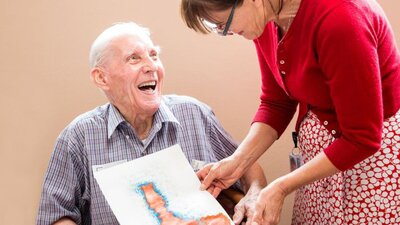Art and Dementia: Art with Friends

Overview
On the third Friday of each month, people living with dementia and their care partners are inspired to respond creatively to works of art in the Gallery’s collection in the Tim Fairfax Learning Studio. Trained educators support all participants to engage in a group setting designed to enhance social sharing, collaboration and confidence.
Art and Dementia: Art with Friends utilises chairs with arms to provide comfort and safety. Visitors receive photocopied reproductions of the works of art discussed as well as their own work.
Mobility aids, such as motorised scooters, wheelchairs, and wheelie walkers are available on request from the Information Desk. Call the phone number provided to book a motorised scooter in advance.
Please note, an online version of this event is available. Visit the website for details.
Dates
2 Feb – 20 Dec 2024Facilities
- Cafe
- Carpark
- Coach Parking
- Conference/Function Facilities
- Family Friendly
- Kiosk
- Lockers
- Non Smoking
- Parents Room
- Public Toilet
- Shop / Gift Shop
- Welcomes and assists people who have challenges with learning, communication, understanding and behaviour. (includes people with autism, intellectual disability, Down syndrome, acquired brain injury (ABI), dyslexia and dementia)
- Caters for people who are blind or have vision loss.
- Caters for people who are deaf or have hearing loss.
- Caters for people with sufficient mobility to climb a few steps but who would benefit from fixtures to aid balance. (This includes people using walking frames and mobility aids)
- Caters for people who use a wheelchair.
- Caters for people with high support needs who travel with a support person.
- Caters for people with allergies and intolerances.
- Accessibility statement